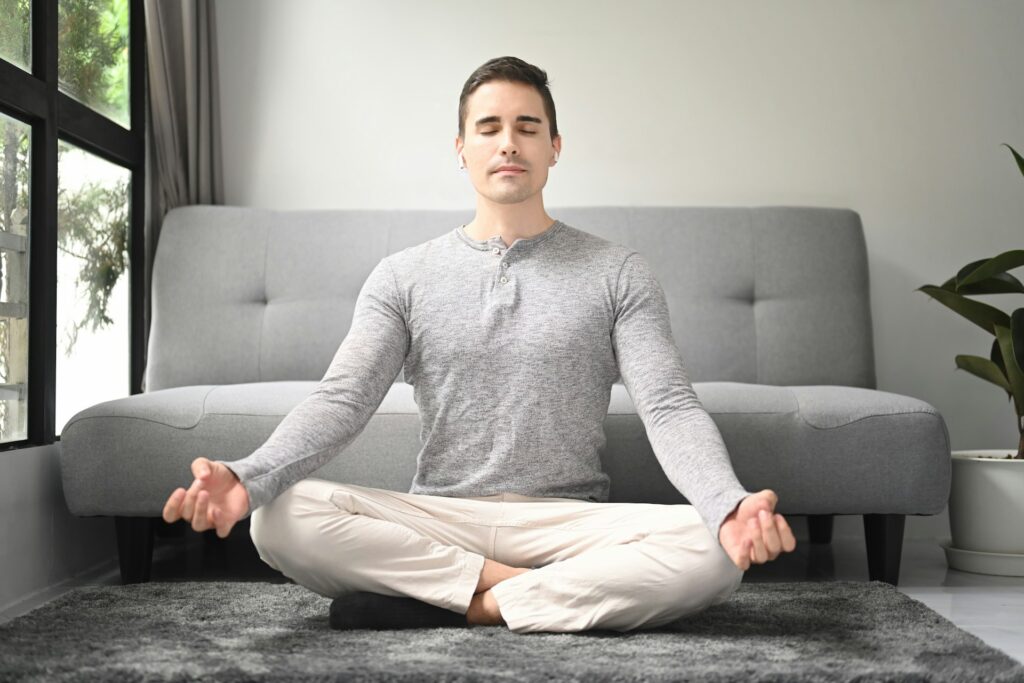Self-care doesn’t have to mean spa days or bubble baths.

Even though those things have no gender attached, a lot of men consider these things “girly” and ultimately unhelpful, which, hey, fair enough. For men, self-care can look like small, straightforward habits that support your mental clarity, physical health, and peace of mind, without feeling like a chore or a performance. If you want to look after yourself a bit better, try adding these things into your routine.
1. Start the day with five quiet minutes to yourself.

You don’t need a full meditation session to benefit from a calm start. Just sitting with your thoughts for five minutes — no phone, no noise — helps clear mental clutter and sets a calmer tone for the day ahead. Whether you’re sipping coffee, stretching, or just staring out the window, giving yourself space before diving into tasks can improve focus and lower stress without needing anything fancy or time-consuming.
2. Keep a regular sleep routine, even on weekends.

Sleep is a foundation for almost everything — your energy, mood, and ability to cope with stress. Going to bed and waking up around the same time each day helps regulate your body clock, which leads to better rest and easier mornings. It doesn’t have to be rigid, but some consistency makes a real difference. You’ll notice it in your patience levels, motivation, and how alert you feel, even without three cups of coffee first thing.
3. Move your body every day, even just a bit.

You don’t have to hit the gym hard to take care of yourself. A walk, a few push-ups, or a quick stretch session can release tension, boost energy, and support your mental clarity. The goal is to feel better, not exhausted. Daily movement helps shake off stress, keep your body strong, and reset your mood when things feel off. It’s a habit that builds discipline quietly, and it gives back more than it takes.
4. Cut down on background noise.

Sometimes silence is underrated. Constant background noise — whether it’s TV, music, or scrolling — keeps your brain in a state of low-level stimulation. Taking regular breaks from it gives your mind a chance to recharge. Even five minutes without input can help lower stress and boost creativity. Try driving without the radio for a bit, or taking a walk with no headphones. It’s a simple way to reconnect with yourself without adding anything new to your to-do list.
5. Make your space work for you.

Your environment affects how you feel more than you probably realise. A cluttered space can quietly drain your energy and focus. Taking ten minutes to tidy up, organise a corner, or fix something you’ve been ignoring can shift your whole mindset. When your space feels functional and clean, it creates a sense of control. And that’s often the kind of support you don’t notice until it’s missing. Your surroundings can either drain you or help you reset, and you get to choose which.
6. Eat meals that actually make you feel good.

This isn’t about diets or cutting out entire food groups. It’s about tuning in to how you feel after you eat. Choosing meals that give you steady energy and don’t leave you bloated or crashing can completely change how you show up in your day. You don’t have to overhaul your habits overnight. Just noticing what foods make you feel clear-headed and strong, and making more room for them, is a form of self-care that builds naturally over time.
7. Make time for something that’s yours.

Hobbies aren’t just for kids — they’re fuel for adults too. Whether it’s playing guitar, building something, gaming, or working on a car, having something that’s just for you helps you decompress and recharge in a way that’s often overlooked. Even if it’s only once a week, that time adds value to your life that work and responsibilities can’t always give. It reminds you that you’re not just here to grind; you’re allowed to enjoy things just for the sake of it.
8. Check in with how you’re really feeling.

It’s easy to skip over emotions or push through stress without naming it, but regular check-ins with yourself help build emotional awareness. Asking “How am I doing, really?” even once a day creates more room for clarity and grounded decision-making.
You don’t need to share it with anyone if you’re not ready. Just being honest with yourself is enough to start shifting how you manage pressure, frustration, or low moods. Naming it doesn’t make you weak. It makes you better equipped to handle life.
9. Set boundaries with work.

Always being available isn’t the same as being dependable. Learning to set limits, like logging off at a certain time or not answering emails during dinner, helps you recharge so you can actually stay sharp during work hours. It’s not about doing less; it’s about working smarter and protecting your energy. The more you respect your time, the easier it becomes for other people to do the same. That’s a long-term game-changer for your stress levels.
10. Talk to someone when you need to.

There’s strength in knowing when to reach out. Whether it’s a mate, a partner, or a professional, sharing what you’re going through can lift a weight off your shoulders. You don’t need to hit rock bottom to ask for support. Connection is part of being human, and talking things out helps you process, gain perspective, and stop carrying things alone. You don’t have to fix everything by yourself to be strong — real strength often starts with honesty.
11. Take proper breaks, not just distractions.

Scrolling isn’t always a real break. Sometimes what your brain actually needs is to step outside, stretch, or even lie down for ten minutes with no input. When you pause with intention, your focus and energy return more naturally. Making time to fully stop, not just switch tasks, is what gives your mind space to reset. Breaks that restore you feel very different from ones that just numb you. And you’ll know the difference when you try them.
12. Do one thing each day that makes future-you grateful.

It could be tidying your space, prepping food, going to bed on time, or finally replying to that email. These little acts of care add up, and they help you feel more in control of your life instead of constantly catching up. When you start doing things as a favour to your future self, self-care shifts from a buzzword to a way of life. It builds trust in yourself, and that’s one of the most underrated forms of confidence there is.


